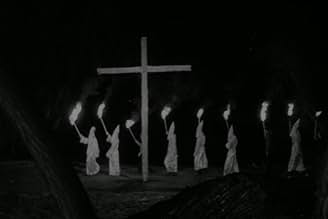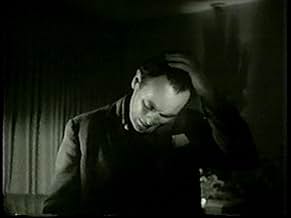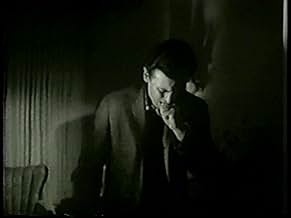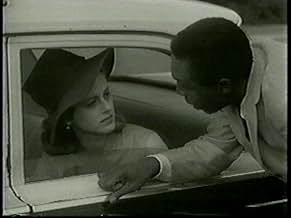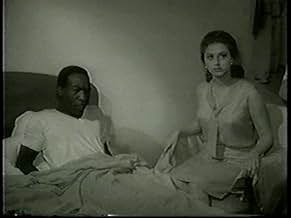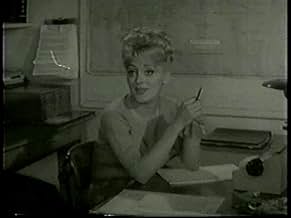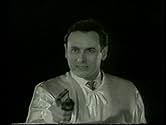Füge eine Handlung in deiner Sprache hinzuAfter a black man's daughter is killed by the KKK, he seeks revenge by becoming a Klansman.After a black man's daughter is killed by the KKK, he seeks revenge by becoming a Klansman.After a black man's daughter is killed by the KKK, he seeks revenge by becoming a Klansman.
- Regie
- Drehbuch
- Hauptbesetzung
James McEachin
- Lonnie
- (as Jimmy Mack)
W. McLennard
- Wallace
- (as William McLennard)
R.L. Armstrong
- Jenkins
- (as Tex Armstrong)
Empfohlene Bewertungen
What can be said? This movie is as disturbing now as it was when it was made. But the acting is so irregular. Sometimes it's comically bad which makes it extremely uncomfortable. The ending is also disappointing.
Oh, this film has flaws all right: Sloppy edits, phony day-for-night, zero budget, and a lot of bad acting. The ending is a bit syrupy as well. But it takes up fascinating questions and plunges headlong into the dark side of American racism, showing KKK meetings, burning crosses, and violence. It treatment of the race question reminds me of the Roger Korman film "The Outsider," in which William Shatner plays a white racist, but in this case a light-skinned black man goes under cover to join the ranks of prejudice. This film's combination of thematic boldness and slipshod execution makes it wonderfully horrible. Or horribly wonderful, I can't figure out which.
If ever there was a time and place to utilize the word 'hoot' in reference to a film, the 'Black Klansman' is transcendental material. How is this piece of art not on DVD as of the year 2004? With mighty waving banner of fierce and vengeful fire, the front man of this film undercuts the enslaving white man by going undercover and tearing down the metaphorical burning cross. In a way, this film is to American HISTORY X as SUBURBIA is to SLC PUNK. This is 1966 exploitation baby, and if you've ever heard the 'N' word, you've still never heard it like this! Shocking today even though no one has seen it. Beg, borrow, steal and investigate getting hold of this film directed by the people who brought you film about zombies and machines that grind up women in bikinis. 4 stars.
The legendary schlock director, creator of such memorable productions as "Astro-Zombies" and "The Doll Squad", actually takes himself seriously for this reasonably effective, interesting comment on race relations in the deep South, circa 1966. This is a time when a civil rights law had been passed, and the white people in this story are none too happy about that. Some of the Klansmen in the small Alabama town of Turnerville try to fire bomb a church and kill the daughter of a man named Jerry Ellsworth (Richard Gilden). Jerry, you see, is a light skinned black who realizes that he could pass for white, so he does so and manages to infiltrate the KKK so that he can get his revenge.
One might have a hard time believing that this is the same Mikels who made those other pictures. It works pretty well, and one can get caught up in the story, written by John T. Wilson and Art Names, and be eager to see the antagonists get their just desserts. This is all done in a very straightforward, no frills manner, and it does get a lot of juice from a standout characterization by Max Julien, later star of "The Mack", as a young revolutionary with a "by any means necessary" type of approach. His scenes are the best in the movie. But star Gilden ('Death Valley Days') does a decent job as well. Harry Lovejoy as Rook is good at playing just the sort of guy who deserves his comeuppance. James McEachin (star of the short-lived 'Tenafly' TV series) makes a strong film debut as Lonnie. Look for Byrd Holland, also the makeup artist on this show, in a small role as the mayor, and B movie legend Gary Kent as Wilkins.
Sharp cinematography by Robert Caramico and atmospheric music by Jaime Mendoza-Nava are solid attributes, and the movie comes complete with a theme song that's a real hoot.
I agree with another review here: it would be too easy to dismiss this as mere exploitation; it does have more depth than some people would expect. It's worth a look.
Eight out of 10.
One might have a hard time believing that this is the same Mikels who made those other pictures. It works pretty well, and one can get caught up in the story, written by John T. Wilson and Art Names, and be eager to see the antagonists get their just desserts. This is all done in a very straightforward, no frills manner, and it does get a lot of juice from a standout characterization by Max Julien, later star of "The Mack", as a young revolutionary with a "by any means necessary" type of approach. His scenes are the best in the movie. But star Gilden ('Death Valley Days') does a decent job as well. Harry Lovejoy as Rook is good at playing just the sort of guy who deserves his comeuppance. James McEachin (star of the short-lived 'Tenafly' TV series) makes a strong film debut as Lonnie. Look for Byrd Holland, also the makeup artist on this show, in a small role as the mayor, and B movie legend Gary Kent as Wilkins.
Sharp cinematography by Robert Caramico and atmospheric music by Jaime Mendoza-Nava are solid attributes, and the movie comes complete with a theme song that's a real hoot.
I agree with another review here: it would be too easy to dismiss this as mere exploitation; it does have more depth than some people would expect. It's worth a look.
Eight out of 10.
Though I never heard of any of the actors except the excellent James McEachin, nearly every single player gives a good to excellent performance.
It starts rather badly, and my thoughts were negative about the director, Ted V. Mikels, whose work is apparently mostly exploitative, and the nominal lead, Richard Gilden. But after a few more scenes, everything shifts into a higher gear and actors and director present us with a good movie.
At this writing, March of 2019, the film is 53 years old. Most of the worst aspects of the problem presented by the story have receded. While Ku Klux Klan and similar organizations still exist, they are generally discounted by most of the rest of the population.
Except: the U.S. "news" media and other Democrats and other left-collectivists would have us believe that every problem in these United States derives from "racism" and that most people, especially those who don't buy into the left-collectivist belief system, are "racists."
In addition, among the left-collectivists, including the "news" media, there is a sickening and disgusting emphasis placed on group identity, which is, in fact, what is wrong with such groups as the KKK, but is somehow accepted when it's from Democrat candidates.
In fact, each of us is an individual, no matter what our skin color. And one point made in this film is that the protagonist, with one black parent, looks white enough to be allowed membership in the Klan.
Not stressed in this movie is the notion that one's skin color or ethnicity cannot lead to any particular belief system. But it's a fact.
Yes, one's culture, one's neighbors, one's schooling can certainly bend a person's thinking, but not that person's skin color, not race or ethnicity.
The premise of this mostly very well-done motion picture is excellent, it's timely, even after the decades since its premiere. The acting is first class, its picture of the rituals of the KKK certainly look real, almost, in spots, like a documentary.
I highly recommend this movie, under whichever title, even if the ending is a bit ambiguous. Very, very well done.
It starts rather badly, and my thoughts were negative about the director, Ted V. Mikels, whose work is apparently mostly exploitative, and the nominal lead, Richard Gilden. But after a few more scenes, everything shifts into a higher gear and actors and director present us with a good movie.
At this writing, March of 2019, the film is 53 years old. Most of the worst aspects of the problem presented by the story have receded. While Ku Klux Klan and similar organizations still exist, they are generally discounted by most of the rest of the population.
Except: the U.S. "news" media and other Democrats and other left-collectivists would have us believe that every problem in these United States derives from "racism" and that most people, especially those who don't buy into the left-collectivist belief system, are "racists."
In addition, among the left-collectivists, including the "news" media, there is a sickening and disgusting emphasis placed on group identity, which is, in fact, what is wrong with such groups as the KKK, but is somehow accepted when it's from Democrat candidates.
In fact, each of us is an individual, no matter what our skin color. And one point made in this film is that the protagonist, with one black parent, looks white enough to be allowed membership in the Klan.
Not stressed in this movie is the notion that one's skin color or ethnicity cannot lead to any particular belief system. But it's a fact.
Yes, one's culture, one's neighbors, one's schooling can certainly bend a person's thinking, but not that person's skin color, not race or ethnicity.
The premise of this mostly very well-done motion picture is excellent, it's timely, even after the decades since its premiere. The acting is first class, its picture of the rituals of the KKK certainly look real, almost, in spots, like a documentary.
I highly recommend this movie, under whichever title, even if the ending is a bit ambiguous. Very, very well done.
Wusstest du schon
- WissenswertesMax Julien (Raymond) and Whitman Mayo (Alex) are both members of Kappa Alpha Psi Fraternity Inc.
- VerbindungenFeatured in The Wild World of Ted V. Mikels (2008)
- SoundtracksThe Black Klansman
By Tony Harris
Top-Auswahl
Melde dich zum Bewerten an und greife auf die Watchlist für personalisierte Empfehlungen zu.
- How long is The Black Klansman?Powered by Alexa
Details
Box Office
- Budget
- 80.000 $ (geschätzt)
- Laufzeit
- 1 Std. 28 Min.(88 min)
- Farbe
- Sound-Mix
- Seitenverhältnis
- 1.85 : 1
Zu dieser Seite beitragen
Bearbeitung vorschlagen oder fehlenden Inhalt hinzufügen

